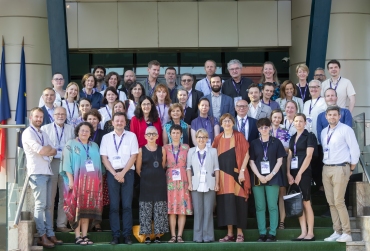 "International Cultural Policy Conference", Bucharest, Romania. Andrei Gindac photo, @culturadata.
"International Cultural Policy Conference", Bucharest, Romania. Andrei Gindac photo, @culturadata.Last month Rūta Stepanovaitė, Director of Administration, and Marija Pečiulytė, Senior Analyst of the Division of Monitoring and Analysis of the Lithuanian Council for Culture have participated in the "International Cultural Policy Conference" in Bucharest, Romania. They also took part in the “5th General Assembly of the Association of the Compendium of Cultural Policies and Trends.
Participants from all over Europe focused on the topic of “Culture and Cultural Policies in Times of Crises – Effects, Roles, Transition”, in times of the war in Ukraine and the related humanitarian crisis, the effects of Covid-19 and the climate crisis. The conference took a closer look at how the cultural sector and cultural policy is dealing with this situation and what actions have been taken to deal with the effects of these crises.

"International Cultural Policy Conference", Bucharest, Romania. Andrei Gindac photo, @culturadata.
The conference consisted of three consecutive panels with the acknowledged speakers such as Milena Dragićević-Šešić (Head of the UNESCO Chair on Interculturalism, Art Management and Mediation, Belgrade) and Levan Kharatishvili (CEO of the Creative Strategies Lab, Georgia). The first panel discussed the effects of the crises on the cultural sector and cultural policies, the second - examined the role and the importance of the cultural sector and its policies that have contributed to overcoming these crises as well as on topics such as culture and democracy, cultural education, the freedom of artistic expression. The third panel analysed the what effects these crises had on cultural policy strategies and programmes. These discussions allowed participants to know the good practices from different countries on how to overcome challenges.

"International Cultural Policy Conference", Bucharest, Romania. Cirpian Zinka photo, @culturadata.
Cultural experts from different countries such as Serbia, Hungary, Ukraine, Italy, Romania and others covered various topics such as how countries are solving the problems at the level of cultural policy, what is the role of international institutions in order to help reduce the effects of crises in the cultural sector, as well as what is the impact of the Covid-19 pandemic on the change of cultural funds in the European context. The speakers also discussed how the war in Ukraine changed the attitude towards culture and how cultural heritage is being preserved as well as what is the impact of European climate warming policy on cultural policy, what are the advantages of cultural education, how it can be enabled during extraordinary situations and crises in cultural policy as well as what is the freedom of artistic expression, its limits or opportunities in a political context.
Rūta Stepanovaitė, Director of Administration, shared her experience in the conference: “We appreciate the opportunity to meet the experts of cultural policy and to discuss the tendencies of cultural policy in the international context. It was also interesting to see Lithuania‘s cultural policy in the light of European practices, for example, to evaluate the funds allocated to cultural sector in the times of financial crisis or Covid-19 pandemic. I believe that it is important to the Lithuanian Council for Culture, as a cultural policy implementation institution, to understand local as well as international cultural policy trends in order to strengthen the functions of our institution, such as the implementation of cultural field research or the participation in preparation and implementation of the European Union financial support programs”.

"International Cultural Policy Conference", Bucharest, Romania. Andrei Gindac photo, @culturadata.
Lithuanian Council for Culture is a member of the Compedium of Cultural Policies and Trends. The Compedium acts as the main platform for European cultural policy analysis, with analysis by independent experts from more than 40 countries. Compendium is targeted to a broad audience of policy makers and administrators, arts institutions and networks, researchers and documentation professionals, journalists and students. The information and data presented online helps to inform decision-making processes, to conduct comparative policy research and analyses, to maintain data collections and to disseminate good practices examples.